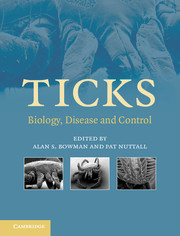Book contents
- Frontmatter
- Contents
- List of contributors
- Preface
- 1 Systematics and evolution of ticks with a list of valid genus and species names
- 2 The impact of tick ecology on pathogen transmission dynamics
- 3 Tick salivary glands: the physiology of tick water balance and their role in pathogen trafficking and transmission
- 4 Tick saliva: from pharmacology and biochemistry to transcriptome analysis and functional genomics
- 5 Tick toxins: perspectives on paralysis and other forms of toxicoses caused by ticks
- 6 Tick lectins and fibrinogen-related proteins
- 7 Endocrinology of tick development and reproduction
- 8 Factors that determine sperm precedence in ticks, spiders and insects: a comparative study
- 9 Tick immunobiology
- 10 Saliva-assisted transmission of tick-borne pathogens
- 11 Lyme borreliosis in Europe and North America
- 12 Viruses transmitted by ticks
- 13 Babesiosis of cattle
- 14 Theileria: life cycle stages associated with the ixodid tick vector
- 15 Characterization of the tick–pathogen–host interface of the tick-borne rickettsia Anaplasma marginale
- 16 Emerging and emergent tick-borne infections
- 17 Analysing and predicting the occurrence of ticks and tick-borne diseases using GIS
- 18 Acaricides for controlling ticks on cattle and the problem of acaricide resistance
- 19 Anti-tick vaccines
- 20 Anti-tick biological control agents: assessment and future perspectives
- 21 Pheromones and other semiochemicals of ticks and their use in tick control
- Index
- References
19 - Anti-tick vaccines
Published online by Cambridge University Press: 21 August 2009
- Frontmatter
- Contents
- List of contributors
- Preface
- 1 Systematics and evolution of ticks with a list of valid genus and species names
- 2 The impact of tick ecology on pathogen transmission dynamics
- 3 Tick salivary glands: the physiology of tick water balance and their role in pathogen trafficking and transmission
- 4 Tick saliva: from pharmacology and biochemistry to transcriptome analysis and functional genomics
- 5 Tick toxins: perspectives on paralysis and other forms of toxicoses caused by ticks
- 6 Tick lectins and fibrinogen-related proteins
- 7 Endocrinology of tick development and reproduction
- 8 Factors that determine sperm precedence in ticks, spiders and insects: a comparative study
- 9 Tick immunobiology
- 10 Saliva-assisted transmission of tick-borne pathogens
- 11 Lyme borreliosis in Europe and North America
- 12 Viruses transmitted by ticks
- 13 Babesiosis of cattle
- 14 Theileria: life cycle stages associated with the ixodid tick vector
- 15 Characterization of the tick–pathogen–host interface of the tick-borne rickettsia Anaplasma marginale
- 16 Emerging and emergent tick-borne infections
- 17 Analysing and predicting the occurrence of ticks and tick-borne diseases using GIS
- 18 Acaricides for controlling ticks on cattle and the problem of acaricide resistance
- 19 Anti-tick vaccines
- 20 Anti-tick biological control agents: assessment and future perspectives
- 21 Pheromones and other semiochemicals of ticks and their use in tick control
- Index
- References
Summary
INTRODUCTION
The case for vaccination as a means of tick control has been made repeatedly and deserves only brief reiteration here. Currently, tick control is heavily dependent on two approaches: the use of chemical pesticides and the use of tick-resistant animals. Chemical pesticides are increasingly problematic for a number of reasons. (1) Resistance to existing pesticides of many chemical classes is widespread and its incidence is increasing (see Chapter 18). The speed with which resistance appears after the release of each new class of chemical is clearly a deterrent to the companies developing such means of parasite control. (2) There is increasing concern about the use of chemicals in all forms of agriculture, both for their potential environmental impact and for their presence in food products. (3) Newer classes of pesticide have tended to be significantly more expensive than their predecessors, an additional deterrent to their application.
Genetically resistant animals, which show a heritable ability to become immunologically resistant to tick infestation, are a vital component of many tick control strategies. They are particularly important in the control of Rhipicephalus (Boophilus) microplus (hereafter referred to as B. microplus) on cattle. However, this approach also has difficulties. For the hosts of many tick species, resistance may simply not develop. Even for B. microplus, it may be difficult to breed tick resistance while preserving other desirable production characteristics such as high milk yield in dairy cattle.
- Type
- Chapter
- Information
- TicksBiology, Disease and Control, pp. 424 - 446Publisher: Cambridge University PressPrint publication year: 2008
References
- 14
- Cited by

